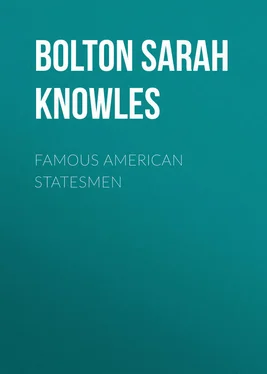Sarah Bolton - Famous American Statesmen
Здесь есть возможность читать онлайн «Sarah Bolton - Famous American Statesmen» — ознакомительный отрывок электронной книги совершенно бесплатно, а после прочтения отрывка купить полную версию. В некоторых случаях можно слушать аудио, скачать через торрент в формате fb2 и присутствует краткое содержание. ISBN: , Жанр: foreign_prose, foreign_antique, foreign_language, на английском языке. Описание произведения, (предисловие) а так же отзывы посетителей доступны на портале библиотеки ЛибКат.
- Название:Famous American Statesmen
- Автор:
- Жанр:
- Год:неизвестен
- ISBN:http://www.gutenberg.org/ebooks/39012
- Рейтинг книги:5 / 5. Голосов: 1
-
Избранное:Добавить в избранное
- Отзывы:
-
Ваша оценка:
- 100
- 1
- 2
- 3
- 4
- 5
Famous American Statesmen: краткое содержание, описание и аннотация
Предлагаем к чтению аннотацию, описание, краткое содержание или предисловие (зависит от того, что написал сам автор книги «Famous American Statesmen»). Если вы не нашли необходимую информацию о книге — напишите в комментариях, мы постараемся отыскать её.
Famous American Statesmen — читать онлайн ознакомительный отрывок
Ниже представлен текст книги, разбитый по страницам. Система сохранения места последней прочитанной страницы, позволяет с удобством читать онлайн бесплатно книгу «Famous American Statesmen», без необходимости каждый раз заново искать на чём Вы остановились. Поставьте закладку, и сможете в любой момент перейти на страницу, на которой закончили чтение.
Интервал:
Закладка:
Jefferson was married to the lady January 1, 1772, and after the wedding started for Monticello. The snow had fallen lightly, but soon became so deep that they were obliged to quit the carriage and proceed on horseback. Arriving late at night, the fires were out and the servants in bed; but love keeps hearts warm, and darkness and cold were forgotten in the satisfaction of having won each other. This satisfaction was never clouded. For years, the home life deepened with its joys and sorrows. A little girl, Martha, was first born into the home; then Jane, who died when eighteen months old, and then an only son, who died in seventeen days. Monticello took on new beauty. Trees were set out and flower-beds planted. The man who so loved nature made this a restful and beautiful place for his little group.
The year after Jefferson's marriage, Dabney Carr, the brilliant young member of the Virginia Assembly, a favorite in every household, eloquent and lovable, died in his thirtieth year. His wife, for a time, lost her reason in consequence. Carr was buried at "Shadwell," as Jefferson was away from home; but, upon his return, the boyish promise was kept, and the friend was interred under the old oak at Monticello, with these words on the stone, written by Jefferson: —
At once, Mrs. Carr, with her six little children, came to Jefferson's home, and lived there ever after, he educating the three sons and three daughters of his widowed sister as though they were his own. Thus true and tender was he to those whom he loved.
For some years past, Jefferson had been developing under that British teaching which led America to freedom. When a student of law, he had listened to Patrick Henry's immortal speech in the debate on the Stamp Act. "I attended the debate," said Jefferson in his Memoir, "and heard the splendid display of Mr. Henry's talents as a popular orator. They were indeed great; such as I have never heard from any other man. He appeared to me to speak as Homer wrote… I never heard anything that deserved to be called by the same name with what flowed from him; and where he got that torrent of language from is inconceivable. I have frequently shut my eyes while he spoke, and, when he was done, asked myself what he had said, without being able to recollect a word of it. He was no logician. He was truly a great man, however, – one of enlarged views."
The whole country had become aflame over the burning of the Gaspee, in March, 1772, – a royal schooner anchored at Providence, R. I. The schooner came there to watch the commerce of the colonies, and to search vessels. She made herself generally obnoxious. Having run aground in her chase of an American packet, a few Rhode Islanders determined to visit her and burn her. The little company set out in eight boats, muffling their oars, reaching her after midnight. The Gaspee was taken unawares, the hands of the crew tied behind them, and the vessel burned.
At once a reward of five thousand dollars was offered for the detection of any person concerned; but, though everybody knew, nobody would tell. Word came from England "that the persons concerned in the burning of the Gaspee schooner, and in the other violences which attended that daring insult, should be brought to England to be tried." This fired the hearts of the colonists. The Virginia House of Burgesses appointed a committee to correspond with other Legislatures on topics which concerned the common welfare. The royal governor of Virginia had no liking for such free thought and free speech as this, and dissolved the House, which at once repaired to a tavern and continued its deliberations.
Soon a convention was called, before which Jefferson's "Summary View of the Rights of British America" was laid. It was worded as a skilful lawyer and polished writer knew how to word it; and it stated the case so plainly that, when it was published, and sent to Great Britain, Jefferson, to use his own words, "had the honor of having his name inserted in a long list of proscriptions enrolled in a bill of attainder commenced in one of the Houses of Parliament, but suppressed by the hasty step of events." Remoteness from England doubtless saved his life.
Jefferson went up to the Continental Congress at Philadelphia, which opened May 10, 1775, taking his "Summary View" with him. The delegates were waiting to see what Virginia had to say in these important days. She had instructed her men to offer a resolution that "the United Colonies be free and independent States," which was done by Richard Henry Lee, on June 7. Four days later, Congress appointed a committee of five to prepare a Declaration of Independence. Thomas Jefferson, only thirty-two, one of the youngest members of Congress, was made chairman. How well he had become fitted to write this immortal document! It was but a condensation of the "Summary View." He was also, says John T. Morse, in his life of Jefferson, "a man without an enemy. His abstinence from any active share in debate had saved him from giving irritation."
The Declaration still exists in Jefferson's clear handwriting. For three days the paper was hotly debated, "John Adams being the colossus of the debate." Jefferson did not speak a word, though Franklin cheered him as he saw him "writhing under the acrimonious criticism of some of its parts."
When it was adopted, the country was wild with joy. It was publicly read from a platform in Independence Square. Military companies gathered to listen to its words, fired salutes, and lighted bonfires in the evenings. The step, dreaded, yet for years longed for, had been taken – separation and freedom, or union and slavery. Jefferson came to that Congress an educated, true-hearted lover of his country; he went back to Martha Jefferson famous as long as America shall endure. He was reëlected to Congress, but declined to serve, as he wished to do important work in his own State, in the changing of her laws.
But now, October 8, 1776, came a most tempting offer; that of joint commissioner with Benjamin Franklin and Silas Deane to represent America at the court of France. He had always longed for European travel; he was a fine French scholar, and could make himself most useful to his new country, but his wife was too frail to undertake the long journey. She was more to him than the French mission, and he stayed at home.
Born with a belief in human brotherhood and a love for human freedom, he turned his attention in the Virginia Legislature to the repeal of the laws of entail and primogeniture, derived from England. He believed the repeal of these, and the adoption of his bill "for establishing religious freedom," would, as he said, form a system by which every fibre would be eradicated of ancient or future aristocracy. "The repeal of the laws of entail would prevent the accumulation and perpetuation of wealth in select families… The abolition of primogeniture, and equal partition of inheritances, removed the feudal and unnatural distinctions which made one member of every family rich and all the rest poor… The restoration of the rights of conscience relieved the people from taxation for the support of a religion not theirs."
There was much persecution of Dissenters by the Established Church. Baptists were often thrown into prison for preaching, as Patrick Henry declared, "the Gospel of the Saviour to Adam's fallen race." For nine years the matter of freedom of conscience was wrestled with, before Virginia could concede to her people the right to worship God as they pleased.
Jefferson was averse to slavery, worked for the colonization of the slaves, and in 1778 carried through a bill against their further importation. He wrote later, in his "Notes on Virginia": "The whole commerce between master and slave is a perpetual exercise of the most boisterous passions, the most unremitting despotism, on the one part, and degrading submissions on the other… I tremble for my country when I reflect that God is just; that his justice cannot sleep forever; that, considering numbers, nature, and natural means only, a revolution of the wheel of fortune, an exchange of situations, is among possible events; that it may become probable by supernatural interference! The Almighty has no attribute which can take side with us in such a contest." When his State could not bring itself to adopt his plan of freeing the slaves, he wrote in his autobiography, in 1821, "The day is not distant when it must bear and adopt it, or worse will follow. Nothing is more certainly written in the book of fate than that these people are to be free." How great indeed was the man who could look beyond his own personal interests for the well-being of the race!
Читать дальшеИнтервал:
Закладка:
Похожие книги на «Famous American Statesmen»
Представляем Вашему вниманию похожие книги на «Famous American Statesmen» списком для выбора. Мы отобрали схожую по названию и смыслу литературу в надежде предоставить читателям больше вариантов отыскать новые, интересные, ещё непрочитанные произведения.
Обсуждение, отзывы о книге «Famous American Statesmen» и просто собственные мнения читателей. Оставьте ваши комментарии, напишите, что Вы думаете о произведении, его смысле или главных героях. Укажите что конкретно понравилось, а что нет, и почему Вы так считаете.












